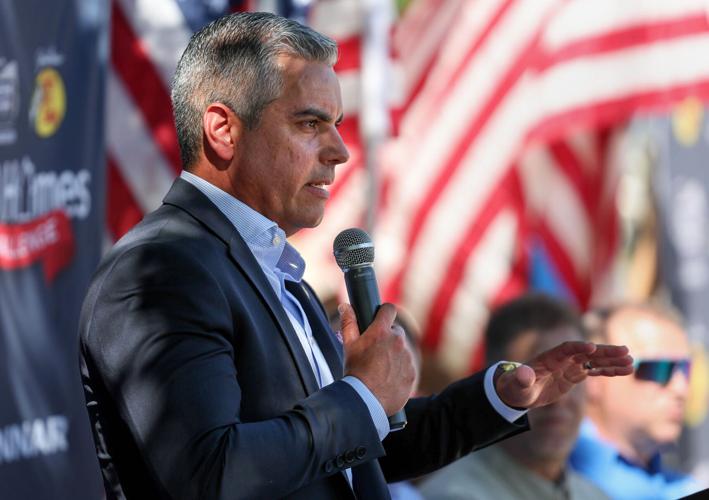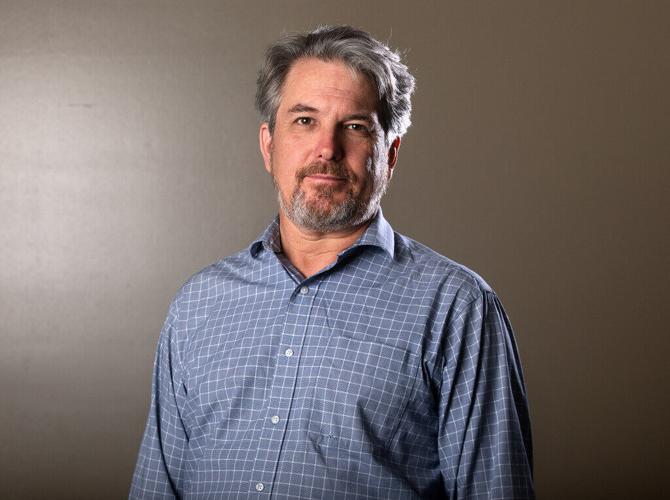When I look at Rep. Juan Ciscomani and his family, the last thing I think of is that they are “poisoning the blood of our country,” or that they have “bad genes.”
In fact, Ciscomani, his wife Laura and their six kids are the picture of a beautiful, accomplished American family.
Yet, the man who Ciscomani supports for president, Donald Trump, has, in effect, said those vile things about his family.

Arizona Daily Star columnist Tim Steller
As my colleague Emily Bregel revealed in Sunday’s Arizona Daily Star, Ciscomani’s in-laws began life in the United States as undocumented migrants, something that has been floated on social media but not covered in a news story before. Laura Ciscomani’s parents crossed the Mexican border illegally more than once, starting in the 1970s, before eventually obtaining legal status in the 1990s, said her brother, Alexander Aviña.
Not only that, but as Bregel reported, Ciscomani’s own family’s naturalization happened in a way that doesn’t make sense from the outside, and that he refused to clarify. Yes, it was legal, but Ciscomani’s father obtained a religious-worker visa under unclear circumstances that, according to several immigration attorneys, don’t add up without further information.
What’s remarkable here is that the family histories of Ciscomani and his wife would suggest the opposite immigration policies of what Ciscomani’s favored presidential candidate, Donald Trump, supports.
That’s one of several contradictions that the story raises.
Aviña emphasized one when he said his and Laura’s parents’ background makes Ciscomani’s hard-edged border stance hypocritical.
“When he attacks refugees, asylum seekers and undocumented migrants, he’s attacking people like my parents, who had a daughter that became his wife, and they have six beautiful kids now,” said Aviña, a professor of Latin American history at ASU.
Ciscomani’s approach to immigration and the border can be summarized as: Stop illegal border-crossings, ease legal immigration, and encourage trade. It makes sense in isolation.
But by supporting Trump and echoing some of his border rhetoric, Ciscomani is sanctioning what Trump is, in effect, saying about his in-laws and, by extension, his own family. Trump has said undocumented people are “poisoning the blood of our country” and this week, that some have “bad genes.”
So, it’s shocking to consider that Ciscomani is supporting Donald Trump for president, even though Trump would try to erase future families like the Ciscomanis, families built by undocumented migration and by skillfully navigating our complicated immigration system.
It goes further, though. Ciscomani has repeatedly expressed support for streamlining the immigration process, which would mean incorporating foreign citizens into the country faster. I think it’s a great idea. Donald Trump doesn’t.
While he was president, Trump supported a bill, the so-called RAISE Act, that would have halved the number of green cards issued each year. It failed, but his administration succeeded at reducing legal immigration.
The Trump administration had already reduced the issuance of immigrant and non-immigrant visas when the pandemic hit in March 2020. Then those visas were practically eliminated altogether. Calculations by the Cato Institute’s Alex Nowsrateh show that Trump’s administration issued more than 400,000 fewer green cards (permanent residency visas) and more than 11 million fewer non-immigrant visas than the second Obama administration.
If Ciscomani wants to speed up legal immigration, he won’t get that from Trump.

Rep. Juan Ciscomani, attended a recent groundbreaking for a Sahuarita home being built for a retired military veteran.
What he will get, perhaps Trump’s strongest and most immediate promise, is mass deportation.
Opponents are warning that this would cause major harm to our economy and also lead to the breakup of millions of families. It’s easy to see how food prices would go up from the deportation of farm workers, and how children could be left without one or both parents.
Imagine if this had happened in the 1980s: Siblings Alexander and Laura could have been orphaned.
Some will argue that today’s migrants are different from those of the 1970s to 1990s. Definitely those who are landing at our border are from more countries.
But there was growing public anger about illegal immigration back in that era, too. Skinheads and members of the KKK roamed San Diego County at times, looking for border-crossers.
That growing public opinion led to the passage, in 1994, of California’s Prop. 187, which banned undocumented people from accessing social services, including health care and public education, even school lunches. The courts later invalidated it.
And I’ve seen no evidence that there are proportionally more criminals or other bad people among those who crossed the border under Biden than there were back then.
So sure, we want to minimize crossings between ports of entry and force people to enter the country through official channels. But the Ciscomani family’s story suggests a different approach: Not mass deportation, but amnesty for those here illegally, and easier paths to citizenship for those who want to join the American family.
Not every family will produce a Stanford University graduate like Laura Ciscomani or a congressman like Juan Ciscomani, but embracing people who want to live here has a lot more potential benefit for this country than labeling them all as genetic rejects with a tendency to violence.





